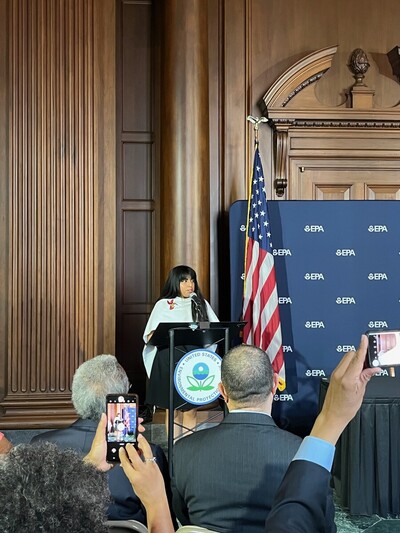
Media
April 9, 2024Following a generation of grassroots advocacy, EPA takes major steps to reduce cancer-causing emissions from select chemical plants

Today, following years of advocacy from environmental justice organizations, the U.S. Environmental Protection Agency (EPA) finalized a rule to significantly reduce emissions of toxic air pollution from an estimated 200 chemical plants, in an effort to reduce elevated cancer risks experienced by fenceline communities.
“It has taken nearly a whole generation of hard work to arrive in DC to make this announcement,” said Nalleli Hidalgo, Education Liaison with Texas Environmental Justice Advocacy Services (T.e.j.a.s.), who introduced EPA Administer Michael Regan at today’s White House signing event.“ As we take this moment in, we remember that we are not here as individuals but as a community standing in solidarity as we witness a key moment in rulemaking to reduce the daily harm our communities face, especially frontline communities that live directly across from HON facilities.”
The final rule will require covered facilities to conduct fenceline air monitoring for emissions of six highly harmful chemicals: ethylene oxide, chloroprene, benzene, 1,3-butadiene, ethylene dichloride and vinyl chloride; it also makes this air monitoring data publicly available and compels facilities take corrective action when leaks are detected. Additionally, the rule:
- Eliminates exemptions for covered facilities that have allowed unpermitted emissions of air toxics during periods of plant start-up, shutdown and malfunction;
- Relies on the best available science to calculate the cancer risk of ethylene oxide, despite consistent unfounded calls from industry and some states not to do so;
- Sets new emissions limits for dioxins and furans, two highly persistent organic pollutants deemed part of the Stockholm Convention’s “Dirty Dozen” which were previously unregulated by this rule;
- And includes a community cancer risk assessment evaluating the impact of the rule on neighboring communities.
Coming Clean, the Environmental Justice Health Alliance for Chemical Policy Reform (EJHA), and T.e.j.a.s. applauded many elements of the finalized rule, which will impact an estimated 28 facilities in Harris County, Texas alone, and at least 40 chemical facilities in counties where EJHA affiliates live.
For example, the rule will require the ExxonMobil olefins plant in Baytown, Texas to monitor and take corrective action to repair leaks of 1-3 butadiene, a carcinogen. The Baytown facility emitted 56,800 lbs of 1,3-butadiene in 2022, has racked up over 25 federal air quality violations in just five years, and injured 30 workers in a 2019 explosion. Community advocates with tejas are currently urging the Texas Council on Environmental Quality to deny the facility’s application for permit renewal.
Notably, the new EPA rule does not require fenceline monitoring for other carcinogenic and harmful air toxics that are commonly emitted by facilities in the affected source category, including formaldehyde, ethylene, toluene and propylene, all of which are emitted by the Baytown olefins plant in 2022.
EPA action on this rule was the result of a 2020 legal petition from Tejas and other organizations noting that EPA was years behind on updating National Emission Standards for Hazardous Air Pollutants (NESHAPs) for the Synthetic Organic Chemical Manufacturing Industry (“SOCMI”) source categories. EPA is still overdue in updating NESHAPs for Polyether Polyols facilities and Chemical Manufacturing Area Sources, which are continuing to emit health-harming air toxics.
T.e.j.a.s., EJHA and Coming Clean are all endorsers of the Louisville Charter for Safer Chemicals, which calls on EPA and other agencies to move away from the paradigm of “acceptable risk” and to a pollution free economy where no worker or community is left behind.
###
Coming Clean is a nonprofit environmental health collaborative working to transform the chemical industry so it is no longer a source of harm, and to secure systemic changes that allow a safe chemical and clean energy economy to flourish. Our members are organizations and technical experts — including grassroots activists, community leaders, scientists, health professionals, business leaders, lawyers, and farmworker advocates — committed to principled collaboration to advance a nontoxic, sustainable, and just world for all.
The Environmental Justice Health Alliance for Chemical Policy Reform is a national network of grassroots Environmental and Economic Justice organizations and advocates in communities that are disproportionately impacted by toxic chemicals from legacy contamination, ongoing exposure to polluting facilities and health-harming chemicals in household products. EJHA supports a just transition towards safer chemicals and a pollution-free economy that leaves no community or worker behind.
Texas Environmental Justice Advocacy Services (T.e.j.a.s) is a grassroots organization based in Houston, TX. T.e.j.a.s is dedicated to providing community members with the tools necessary to create sustainable, environmentally healthy communities by educating individuals on health concerns and implications arising from environmental pollution, empowering individuals with an understanding of applicable environmental laws and regulations and promoting their enforcement, and offering community building skills and resources for effective community action and greater public participation. Our goal is to promote environmental protection through education, policy development, community awareness, and legal action. Our guiding principle is that everyone, regardless of race or income, is entitled to live in a clean environment.
Available for Comment
Deidre Nelms; Communications Director; Coming Clean; (802) 251-0203 ext. 711, dnelms@comingcleaninc.org.
